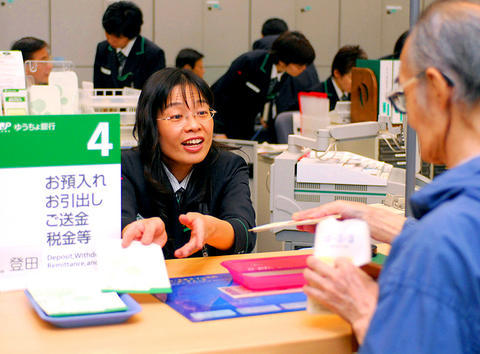Japan broke up its sprawling post office yesterday, spinning off a bank with the world's largest savings at the start of a privatization process set to reshape the country's financial services industry.
Japan Post was split into four units to handle deliveries, savings, insurance and counter services. It was in effect the world's biggest bank, with some US$3 trillion in postal savings and life insurance policies.
The split is the initial step in a decade-long process that counts as the first major privatization in Japan since the 1987 breakup of the national railway.

PHOTO: AFP
Major post offices opened one hour earlier than usual to mark the overhaul, which was at the core of former prime minister Junichiro Koizumi's reform agenda to streamline the bloated public sector.
"We are facing a tremendous challenge," said the head of the post office's new holding company, Yoshifumi Nishikawa, a former head of Sumitomo Mitsui Banking. The government picked him to oversee the privatization.
Koizumi, who staked his leadership on postal privatization, joined other prominent politicians to cut the tape at the launch of Japan Post Holdings Co, the holding company 100 percent owned by the government.
"Before I took office, all parties were against privatizing the post office. It was thanks to people's support that we were able to realize" it, he said.
At Tokyo's central post office, some 350 people, many of them elderly citizens, lined up to buy commemorative stamps and other mementos.
The post office's assets are largely invested in government bonds, helping Japan to maintain huge public debts.
The government hopes that reform will boost competition in the financial services sector and reduce the flow of funds from Japan Post into popular but often wasteful public works projects.
Japanese Prime Minister Yasuo Fukuda said that the postal operator would strive to become more efficient.
Although a rapid revolution in Japan's financial services industry is unlikely, the stirring giant is likely to gradually venture into new business areas, ratcheting up the pressure on existing commercial banks, experts said.
But critics fear postal reform will lead to a focus on more profitable regions and the closure of some of the country's 24,000 post offices. Small-town postal workers often deliver medicine and pension payments in cash to elderly people unable to run errands for themselves.
Under the privatization plan, the banking and life insurance units could float on the stock market as soon as in 2009.

MORE VISITORS: The Tourism Administration said that it is seeing positive prospects in its efforts to expand the tourism market in North America and Europe Taiwan has been ranked as the cheapest place in the world to travel to this year, based on a list recommended by NerdWallet. The San Francisco-based personal finance company said that Taiwan topped the list of 16 nations it chose for budget travelers because US tourists do not need visas and travelers can easily have a good meal for less than US$10. A bus ride in Taipei costs just under US$0.50, while subway rides start at US$0.60, the firm said, adding that public transportation in Taiwan is easy to navigate. The firm also called Taiwan a “food lover’s paradise,” citing inexpensive breakfast stalls

TRADE: A mandatory declaration of origin for manufactured goods bound for the US is to take effect on May 7 to block China from exploiting Taiwan’s trade channels All products manufactured in Taiwan and exported to the US must include a signed declaration of origin starting on May 7, the Bureau of Foreign Trade announced yesterday. US President Donald Trump on April 2 imposed a 32 percent tariff on imports from Taiwan, but one week later announced a 90-day pause on its implementation. However, a universal 10 percent tariff was immediately applied to most imports from around the world. On April 12, the Trump administration further exempted computers, smartphones and semiconductors from the new tariffs. In response, President William Lai’s (賴清德) administration has introduced a series of countermeasures to support affected

CROSS-STRAIT: The vast majority of Taiwanese support maintaining the ‘status quo,’ while concern is rising about Beijing’s influence operations More than eight out of 10 Taiwanese reject Beijing’s “one country, two systems” framework for cross-strait relations, according to a survey released by the Mainland Affairs Council (MAC) on Thursday. The MAC’s latest quarterly survey found that 84.4 percent of respondents opposed Beijing’s “one country, two systems” formula for handling cross-strait relations — a figure consistent with past polling. Over the past three years, opposition to the framework has remained high, ranging from a low of 83.6 percent in April 2023 to a peak of 89.6 percent in April last year. In the most recent poll, 82.5 percent also rejected China’s

PLUGGING HOLES: The amendments would bring the legislation in line with systems found in other countries such as Japan and the US, Legislator Chen Kuan-ting said Democratic Progressive Party (DPP) Legislator Chen Kuan-ting (陳冠廷) has proposed amending national security legislation amid a spate of espionage cases. Potential gaps in security vetting procedures for personnel with access to sensitive information prompted him to propose the amendments, which would introduce changes to Article 14 of the Classified National Security Information Protection Act (國家機密保護法), Chen said yesterday. The proposal, which aims to enhance interagency vetting procedures and reduce the risk of classified information leaks, would establish a comprehensive security clearance system in Taiwan, he said. The amendment would require character and loyalty checks for civil servants and intelligence personnel prior to